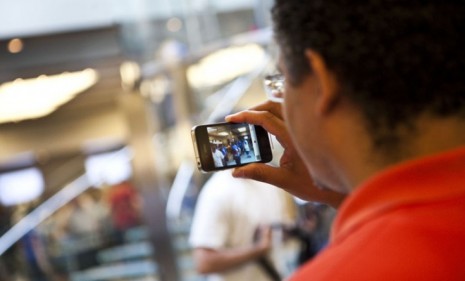The iPhone location-tracking controversy: How nervous should you be?
Some say smartphones that track users' locations pose an Orwellian danger to privacy

A free daily email with the biggest news stories of the day – and the best features from TheWeek.com
You are now subscribed
Your newsletter sign-up was successful
With many iPhone users still fuming over the revelation that Apple's phones track users' locations, new reports say that smartphones relying on Google's Android operating system do the same thing. Google says it has an "opt-in" policy that lets users know about the data collection, and insists no names are attached to locations in their records. Nevertheless, Rep. Edward Markey (D-Mass.) is calling for a congressional investigation into the privacy practices of Apple and other tech firms. Are these location-tracking features really a privacy risk?
Google is OK, but Apple's approach is shady: Google's tracking system only retains limited data, but Apple's months-long log creates a "security flaw" that could be problematic if your phone fell into the wrong hands, say Brian X. Chen and Mike Isaac at Wired. Thieves or hackers who got access to the database file on your phone could "figure out where you live and loot you there, too." But don't "smash your iPhone with a hammer" just yet — instead, demand that Apple change this policy, and quickly.
"Why you should care about the iPhone location-tracking issue"
The Week
Escape your echo chamber. Get the facts behind the news, plus analysis from multiple perspectives.

Sign up for The Week's Free Newsletters
From our morning news briefing to a weekly Good News Newsletter, get the best of The Week delivered directly to your inbox.
From our morning news briefing to a weekly Good News Newsletter, get the best of The Week delivered directly to your inbox.
Trading a little privacy for convenience is worth it: "I do not care if Apple and Google know where I am," says Lance Ulanoff at PCMag. Our phones are "10 times more useful" because they can transmit their locations "to a variety of services and partners." We're all being tracked as it is — by our cars' GPS systems, by traffic cams, and by banks, credit card providers, and phone companies. Plus, the data Apple and Google collect isn't even that precise. They may know what neighborhood you're in, but not which house or business, presumably a comfort to "philanderers who are at their girlfriend's house when they told their wives they'd be out bowling."
"Location is not a four letter word"
Apple isn't the only "big bad villain" here: The location file on iPhones was "incredibly difficult to access" — until it was revealed by two hackers last week, says David Pogue in The New York Times. They created a downloadable app that makes a map out of the once-hidden data file. "In other words, the location log was never public or accessible until these two guys came along and made it easy to see." So shouldn't these researchers also "bear some responsibility for turning the log into a threat?"
"Your iPhone is tracking you. So what?"
A free daily email with the biggest news stories of the day – and the best features from TheWeek.com
-
 How the FCC’s ‘equal time’ rule works
How the FCC’s ‘equal time’ rule worksIn the Spotlight The law is at the heart of the Colbert-CBS conflict
-
 What is the endgame in the DHS shutdown?
What is the endgame in the DHS shutdown?Today’s Big Question Democrats want to rein in ICE’s immigration crackdown
-
 ‘Poor time management isn’t just an inconvenience’
‘Poor time management isn’t just an inconvenience’Instant Opinion Opinion, comment and editorials of the day